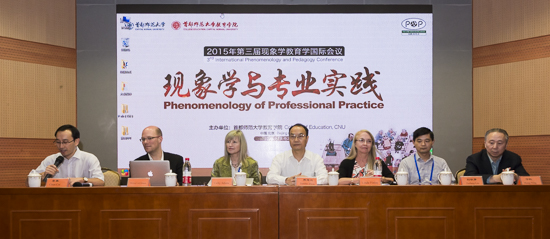Phenomenology beneficial to educational practice

The third International Phenomenology and Pedagogy Conference was held at Capital Normal University from Sept. 18 to 20, with the theme “Phenomenology of Professional Practice.”
The third International Phenomenology and Pedagogy Conference was held at Capital Normal University from Sept. 18 to 20. More than 100 experts and scholars conducted in-depth discussions, focusing on the theme of “Phenomenology of Professional Practice.”
In an era of transformation, achievements have been made in professional educational practice in the field of phenomenology, but there are still many challenges ahead. Zhou Jianshe, vice-president of Capital Normal University addressed the opening ceremony. He said that, taking “returning to things themselves” as its slogan, phenomenology has not only launched contemporary practical philosophy but has also provided ideological sources for studies and practice of the humanities, such as pedagogy and psychology. The strong practical orientation of phenomenology motivates us to constantly question, reflect and explore the complexity and vitality of professional practice and daily life experience, he said.
Max van Manen, honorary professor from the University of Alberta in Canada, said that “phenomenological pedagogy” contains two themes:phenomenology and pedagogy. He explained that phenomenology is a science about surprise, language and the world. It is not only a name for a discipline of the humanities but also a psychological source that is beneficial to exploring the significance of the world where we live as well as the essence of the responsibility for our personal behavior and decision-making. Pedagogy focuses on educational tact, reflection and adult interactions with children. Pedagogy stimulates the reproduction, beginning and source of human nature.
Participating scholars posited that the study of phenomenological pedagogy is conducive to resolving many theoretical and practical problems that are currently troubling China’s educational field. Adhering to the orientation of practical psychology, phenomenological pedagogy aims to research teaching from the perspective of the development of children’s consciousness and quality as well as their experience in schools.
Phenomenological pedagogy not only provides frontline teachers with proper methods but also always focuses on how to equip teachers with the intention, belief and understanding of human civilization and education, resulting in an endless source of motivation to drive teachers’ sustainable development. In this sense, phenomenological pedagogy is of profound significance in terms of cultivating students from normal universities and effectively enhancing the professional development of in-service teachers.
The international phenomenology and pedagogy conference helps us to comprehensively grasp the ideas of phenomenological pedagogy and expands the vision and field of the study of pedagogy. Meanwhile, it has also stimulated researchers and practitioners’ pedagogical consciousness and drawn our attention to the pedagogical significance of daily life events, giving phenomenological pedagogy an effective impact on China’s educational research and practice.
Zhang Lin is a reporter at the Chinese Social Sciences Today.

 PRINT
PRINT CLOSE
CLOSE